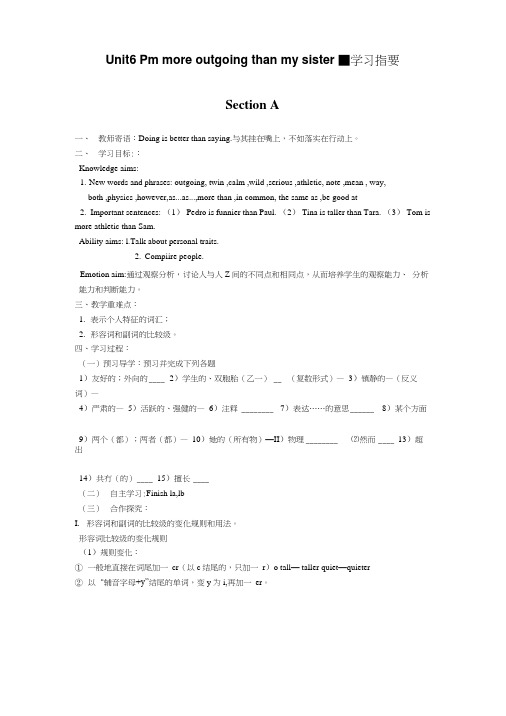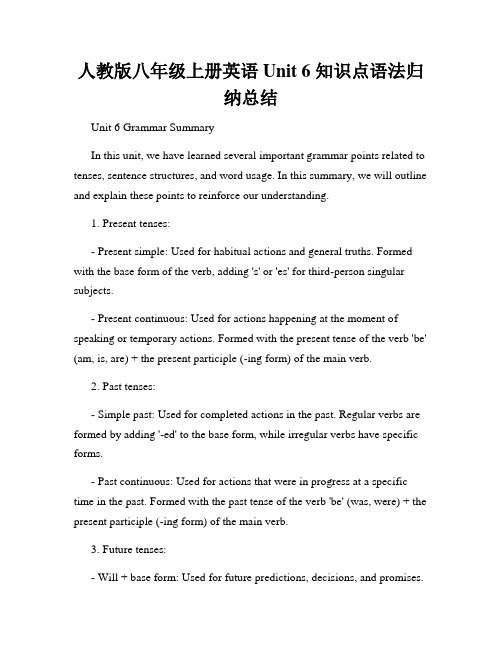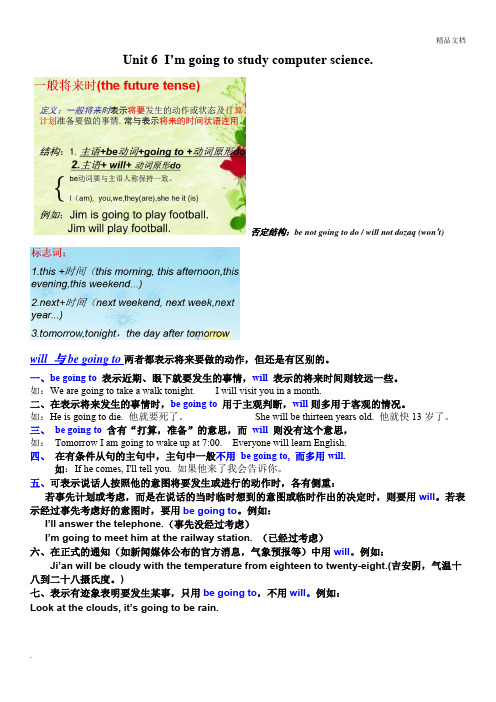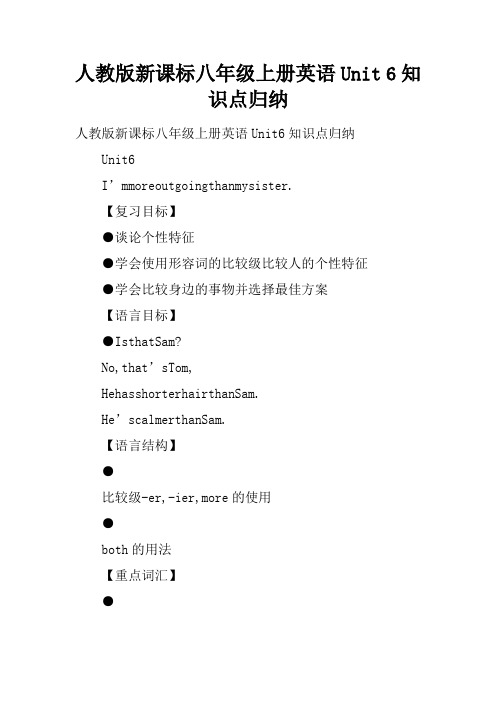(完整word版)人教版初二上册英语第六单元unit6语法篇
Unit 6知识归纳人教版英语八年级上册

Unit 6知识归纳I’m going to study computer science.一、重点短语Section A1.an engineer/actor/actress/artist一位工程师/男演员/女演员/艺术家2.职业名词(补充)nurse护士/lawyer律师/postman 邮递员solider士兵/director 导演/baker 面包师3.grow up 长大/ grow old 变老4.practice/finish/mind/stand/enjoy doing sth练习/完成/介意/忍受/享受做某事5.want to be a doctor 想当医生6.move to Shanghai 搬去上海7.be good at writing stories 擅长写故事8.keep on writing stories 坚持写故事keep doing sth一直做某事keep silent/quiet/healthy 保持沉默/安静/健康keep the classroom clean 保持教室干净keep the water running 水一直流着keep the seat for him 给他留个座位keep the book for a month 借一个月书keep sb doing sth使某人一直做某事keep sb from doing 阻止某人做某事9.take singing/acting/guitar lessons上声乐/表演/吉他课10.study math/physics/computer science hard努力学数学/物理/电脑科学11.be sure about/of sth 对…有把握make sure 确保make sure of sth 弄清楚…be/make sure (not) to do sth 一定(不)做某事12.don’t worry 别担心13.go to college/university 上大学14.study medicine at a university 在大学学医15.a race car driver 一名赛车手16.go to a cooking school 上烹饪学校17.take the medicine 吃药18.send an article to you=send you an article寄篇文章给你send him to a boarding school送他去寄宿学校Class:________________Name:________________Section B1.learn to play the piano 学习弹钢琴2.make the soccer team 组建球队3.eat healthier food 吃更健康的食物4.get lots of exercise 多锻炼5.learn another foreign language 学另一门外语6.be not for me 不适合我7.be able to keep it 能够坚持它8.a kind of promise 一种承诺9.make promises to other people 对他人许诺keep/break a promise 信守/违背承诺10.promise sb sth= promise sth to sb向某人承诺某事promise (sb)to do sth 承诺做某事11.tidy my room 整理我的房间12.the most common kind 最普通的一种13.New Year’s resolutions 新年决心14.at the beginning/start of the year 年初at the end of the story 在故事的结尾in the beginning/end 起初/最后15.a time for making resolutions 下决心的时候16.improve our lives改善我们的生活17.write down their resolutions 写下他们的决心18.for the coming year 为来年19.different kinds of resolutions不同种类的决心20.physics health 身体健康21.start an exercise program 开启一项运动计划22.eat less fast food 少吃垃圾食品23.have to do with self-improvement与自我改进有关系have much/nothing to do with与…有很大/没有关系24.make yourself a better man 使自己变得更好25.take up a hobby 开始一种爱好take up doing sth 学着做某事26.better planning 更好的规划27.make a weekly plan for schoolwork制定每周学习计划28.too difficult to keep 很难去坚持29.for this reason 出于这个原因30.What’s the meaning of this word?=What does this word mean?=What do you mean by this word?这个单词什么意思?31.It’s his own car. =It’s the car of his own.=He is the owner of the car.= He owns the car.这是他自己的车。
人教版八年级英语上册第六单元Unit-6.doc

Unit6 Pm more outgoing than my sister ■学习指要Section A一、教师寄语:Doing is better than saying.与其挂在嘴上,不如落实在行动上。
二、学习目标::Knowledge aims:1.New words and phrases: outgoing, twin ,calm ,wild ,serious ,athletic, note ,mean , way,both ,physics ,however,as...as...,more than ,in common, the same as ,be good at2.Important sentences: (1) Pedro is funnier than Paul. (2) Tina is taller than Tara. (3) Tom is more athletic than Sam.Ability aims: l.Talk about personal traits.piire people.Emotion aim:通过观察分析,讨论人与人Z间的不同点和相同点,从而培养学生的观察能力、分析能力和判断能力。
三、教学重难点:1.表示个人特征的词汇;2.形容词和副词的比较级。
四、学习过程:(一)预习导学:预习并完成下列各题1)友好的;外向的____ 2)学生的、双胞胎(乙一) __ (复数形式)—3)镇静的—(反义词)—4)严肃的—5)活跃的、强健的—6)注释 ________ 7)表达……的意思______ 8)某个方面9)两个(都);两者(都)—10)她的(所有物)—II)物理________ ⑵然而____ 13)超出14)共冇(的)____ 15)擅长____(二)自主学习:Finish la,lb(三)合作探究:I.形容词和副词的比较级的变化规则和用法。
形容词比较级的变化规则(1)规则变化:①一般地直接在词尾加一cr(以c结尾的,只加一r)o tall— taller quiet—quieter②以“辅音字母+y”结尾的单词,变y为i,再加一er。
Unit6重点知识梳理及语法专项讲义人教版八年级英语上册

Unit6重点梳理一、重点词汇词形变化2.begin v. 开始→_____________过去式→ _____________ n.开头,开端3.improve v. 改善→ ___________n.提高;进步5.mean v. 意思是,意味→____________过去式→_____________ n. 意思,意义→_____________ adj. 有意义的_____________ adj. 毫无意义的6. discuss v. 讨论,商量→_____________ n. 讨论,商量8.person n.人→___________ adj.个人的,私人的二、短语1._______________能够做某事2._______________写下,记下3._______________开始做,学着做4._______________ 下决心5._______________ 在…开始,6._______________ 许下诺言7._______________关于;与…有关系8._______________对……有把握9._______________ 确保;查明10._______________.......的意思11._______________ 有相同点12._______________太……而不能三、词法1.Just make sure you try your best. 保证尽自己的最大努力。
(1)make sure=be sure “确信,务必,查明,弄清楚”(2)make sure of sth. “确保/ 查明某事”(3)make sure + that从句(that可省略) “确保/ 查明……”(4)make sure to do sth. 务必做.......【运用】完成句子。
1) 明天的比赛务必准时到达。
_______ _______ _______ _______ on time for the petition tomorrow.2) 确保每个人都得到了信息。
人教版英语八年级上册Unit 6 单元知识点

Unit 6 I'm going to study computer science知识点1 一般将来时表示将来某个时间要发生的动作或存在的状态,也表示将来经常或反复发生的动作,常与表示将来的时间状语连用,如tomorrow,next week,next year,in the future等。
构成:1)主语+助动词will+动词原形+其他2)主语+be going to+动词原形+其他考点1 主语+助动词will+动词原形+其他一般将来时的肯定式、否定式和疑问式如下:(以go为例)预言将来发生的事,表示单纯意义上的将来。
典例—My aunt ________ me to Europefor vacation next month.—Have a good time! (海南)A.take B.took C.will takebe going to与will都可表示将要发生的事或将要去做的事,但有如下几点区别:there be句型的一般将来时(1)there be 句型的一般将来时的构成是“There will be+主语+其他.”,意为“将会有……”。
There will be a basketball match tonight.今天晚上将有一场篮球赛。
(2)其一般疑问句形式为“Will there be+主语+其他?”其肯定回答是:“Yes,there will.”。
否定回答是:“No,there won't.”。
—Will there be a basketball match tonight?今天晚上将有一场篮球赛吗?—Yes,there will.是的,会有。
/No,there won't.不,没有。
(3)否定形式是在will后加not,即“There won't be+主语+其他.”,意为“将不会有……”。
eg: There won't be a basketball match tonight. 今天晚上没有篮球赛。
人教版八年级上册英语Unit 6 知识点语法归纳总结

人教版八年级上册英语Unit 6 知识点语法归纳总结Unit 6 Grammar SummaryIn this unit, we have learned several important grammar points related to tenses, sentence structures, and word usage. In this summary, we will outline and explain these points to reinforce our understanding.1. Present tenses:- Present simple: Used for habitual actions and general truths. Formed with the base form of the verb, adding 's' or 'es' for third-person singular subjects.- Present continuous: Used for actions happening at the moment of speaking or temporary actions. Formed with the present tense of the verb 'be' (am, is, are) + the present participle (-ing form) of the main verb.2. Past tenses:- Simple past: Used for completed actions in the past. Regular verbs are formed by adding '-ed' to the base form, while irregular verbs have specific forms.- Past continuous: Used for actions that were in progress at a specific time in the past. Formed with the past tense of the verb 'be' (was, were) + the present participle (-ing form) of the main verb.3. Future tenses:- Will + base form: Used for future predictions, decisions, and promises.- Be going to + base form: Used for future plans or intentions.- Present continuous: Used for future arrangements or fixed plans.4. Gerunds and infinitives:- Gerunds: Verb forms ending in '-ing' that function as nouns.- Infinitives: Base form of the verb preceded by 'to' that can function as nouns, adjectives, or adverbs.5. Passive voice:- Formed with the auxiliary verb 'be' + past participle. The subject of the active voice sentence becomes the object in the passive voice.6. Reported speech:- Reporting verbs such as say, tell, ask, etc., are used to report what someone said.- Reported speech involves changing verb tenses, pronouns, time expressions, and place expressions.7. Conditional sentences:- Zero Conditional: Used for general truths and facts. Formed with present simple in both the if-clause and the main clause.- First Conditional: Used for possible events in the future. Formed with present simple in the if-clause and future simple (will + base form) in the main clause.- Second Conditional: Used for hypothetical or unreal events in the present or future. Formed with past simple in the if-clause and would + base form in the main clause.- Third Conditional: Used for hypothetical or unreal events in the past. Formed with past perfect in the if-clause and would have + past participle in the main clause.8. Comparative and superlative forms:- Comparative: Used to compare two things. Most adjectives add '-er' or use 'more' before the adjective. Irregular forms have specific comparative forms.- Superlative: Used to compare three or more things. Most adjectives add '-est' or use 'most' before the adjective. Irregular forms have specific superlative forms.Remember to practice these grammar points through exercises and conversation to develop a strong foundation in English grammar.。
人教版八年级英语上册 unit6 语法+知识点

Unit 6 I’m going to study computer science.否定结构:be not going to do / will not dozaq (won’t)will 与be going to两者都表示将来要做的动作,但还是有区别的。
一、be going to表示近期、眼下就要发生的事情,will表示的将来时间则较远一些。
如:We are going to take a walk tonight. I will visit you in a month.二、在表示将来发生的事情时,be going to用于主观判断,will则多用于客观的情况。
如:He is going to die. 他就要死了。
She will be thirteen years old. 他就快13岁了。
三、be going to含有“打算,准备”的意思,而will则没有这个意思,如:Tomorrow I am going to wake up at 7:00. Everyone will learn English.四、在有条件从句的主句中,主句中一般不用be going to, 而多用will.如:If he comes, I'll tell you. 如果他来了我会告诉你。
五、可表示说话人按照他的意图将要发生或进行的动作时,各有侧重:若事先计划或考虑,而是在说话的当时临时想到的意图或临时作出的决定时,则要用will。
若表示经过事先考虑好的意图时,要用be going to。
例如:I’ll answer the telephone.(事先没经过考虑)I’m going to meet him at the railway station. (已经过考虑)六、在正式的通知(如新闻媒体公布的官方消息,气象预报等)中用will。
例如:Ji’an will be cloudy with the temperature from eighteen to twenty-eight.(吉安阴,气温十八到二十八摄氏度。
八年级英语上册 第六单元语法中知识点分析 人教新目标版

Unit6 I’m more outgoing than my sister.⒈⑴calm形容词意为“镇静的;沉着的”。
E g: We must be calm before danger.危险面前我们要沉着冷静。
Tina was frightened, but she answered in calm voice.蒂娜虽然害怕,但回答得很冷静。
搭配stay calm=keep calm保持冷静。
⑵动词“使……平静;安静;镇静。
”⒉serious 形容词“庄重的;严肃的;严重的;危险的”。
E g:Tina is more serious than Linda.蒂娜比琳达严肃点。
He is serious about the problem.他对那个问题很认真。
My grandma has a serious illness.我奶奶病得很厉害。
搭配:nothing serious不严重,没事儿;be serious about…认真对待…⒊However 副词意为“然而”。
E g: It looks like rain. However ,it is clear this morning.天看起来好像有雨,然而今天早晨晴天。
⒋⑴both 代词“两个(都);(两者)都”。
E g:There are shops on both sides of the streets.街道两边都有商店。
搭配:both of两者都;both A and both B不仅……而且。
Both of us have short hair。
我们俩都是短发。
Both Lucy and Lily are here。
露西和莉莉都在这。
⑵形容词“两者的;双方的”。
Both men were kind to me。
两个人对我都很友善。
⒌Do you enjoy playing basketball? 你喜欢打篮球吗?拓展:enjoy oneself = have a good time。
人教版新课标八年级上册英语Unit 6知识点归纳

人教版新课标八年级上册英语Unit 6知识点归纳人教版新课标八年级上册英语Unit6知识点归纳Unit6I’mmoreoutgoingthanmysister.【复习目标】●谈论个性特征●学会使用形容词的比较级比较人的个性特征●学会比较身边的事物并选择最佳方案【语言目标】●IsthatSam?No,that’sTom,HehasshorterhairthanSam.He’scalmerthanSam.【语言结构】●比较级-er,-ier,more的使用●both的用法【重点词汇】●more,than,/moreathletic,morepopular,/twin,both,bego odat●taller,shorter,thinner,longer,heavier,calmer,wilder ,quieter,funnier,smarter【应掌握的词组】.longhair长头发2.Howareyou?你身体好吗?3.Howold多大年纪4.howtall多高5.howlongago多久前(的事)6.moreoutgoing比较外向7.want/plantodosth.意欲,企图8.herearephotosofme这是我的照片9.asyoucansee正如你所看到的0.insomeways在某些地方1.welookthesame我们看起来一样,Theylookdifferent 他们看起来不同2.thesameto……多……是一样的3.quitethesame完全一样4.allthesame还是,同样应……5.looklike看起来像….一样,而lookthesame看起来很像6.gotolotsofparties经常参加聚会=oftengototheparty7.alittletaller高一点8.takesth.fromsth.从某处拿/取出某物9.putsth.insth.将某物放入某物中20.makealistof列出清单21.hascoolclothes有漂亮的衣服22.ispopularinschool在学校受欢迎23.isgoodatsports擅长体育24.makemelaugh使我发笑25.that’snotveryimportantforme那对我来说并不重要26.putup举起,抬起,挂起,张贴,建造;puton穿上,戴上,上演(戏剧);putdown=writedown=copydown写下来;putout伸出,扑灭;putaway收起来,收好;putoff推迟;putone’sheartinto…全神贯注于……,全身心投入……27.oppositeviews相反的观点28.aweekendteacher周末教师29.AbacusStudycenter珠算研究中心30.elementaryschoolstudents小学生31.begoodwithchildren善于与孩子相处32.havegoodgrades成绩出色33.enjoytellingjokes喜欢讲笑话34.can’tstoptalking不能停止讲话35.helpothers帮助别人,helpeachother互相帮助36.inone’sfreetime在业余时间37.oneof+复数名词(代词)……其中之一esth.todosth.=dosth..withsth.使用…做…39.be/feelsorryforsb.为某事感到同情或难受;be/feelsorryforsth.因某事感到抱歉或后悔;besorry+tosee/hear听到或看到某种情况很不安或难过;saysorrytosb.向某人道歉40.beginwith从……开始41.nextto在……旁边,紧靠……42.befamousfor因…而著名,因……而广为人知;befamousas作为……而知名43.alltogether总计,总共44.makesb.dosth.让/使某人做某事,相似的用法有几个感官动词see,let,hear,watch,feel 等【应该掌握的句子】.whatareyoudoingforvacation?I’mbabysittingmysister.假期你要做什么?我要照顾我的妹妹。
- 1、下载文档前请自行甄别文档内容的完整性,平台不提供额外的编辑、内容补充、找答案等附加服务。
- 2、"仅部分预览"的文档,不可在线预览部分如存在完整性等问题,可反馈申请退款(可完整预览的文档不适用该条件!)。
- 3、如文档侵犯您的权益,请联系客服反馈,我们会尽快为您处理(人工客服工作时间:9:00-18:30)。
Unit 6 语法篇一般将来时一般将来时表示将来某一时刻或经常发生的动作或状态。
①一般将来时的时间状语有:tomorrow, this (afternoon),next (year),one day, now, soon,someday, sometime, in the future, when引导的从句等。
②用will构成的将来时,表示动作与人的主观愿望无关。
“shall”用于第一人称,“will”用于所有人称。
如:I will graduate from this school soon.(我很快就要从这所中学毕业了)You will stay alone after I leave.(我走了之后你就要一个人过了)③“am/is/are going to+动词原形”表示打算或准备要做的事情,或者主观判断即将要发生的事情,而“am/is/are to +动词原形”表示安排或计划中的动作。
如:A man told them that the woman was to give birth to the special baby.(有一个人告诉他们那个妇女就会生下那个特别的男孩)It’s going to rain soon.(天快要下雨了)④表示一个人临时决定要做某事,可以用will表达。
如:I will go to the lab to get some chemicals(化学药剂).So please wait until I return.(我要到化学实验室去取些药品,请等我回头)⑤shall和will 在口语的一些疑问句中相当于情态动词。
Shall一般与第一人称连用,will与第二人称连用。
如:Shall we go to the zoo next Saturday?(我们下周六去动物园好吗?)Will you please open the door for me?(替我把门打开好吗?)⑥“be to +动词原形”表示按照计划将要发生的事情。
如:An angel came to tell her that she was to have this special boy.1. Next week I a party.A. am going to haveB. hadC. is havingD. has2. Jerry promised his bedroom later.A. tidyingB. to tidyC. tidiesD. tidied3. Do you want to a doctor when you're older?A. isB. areC. beD. am4. 你长大了想做什么?What do you want to be when you ?A. will grow upB. grow upC. is going to grow upD. grew up5. Mary is going to study in England, so she often practices English with her friends.A. speaksB. to speakC. speakingD. spoken一、单选1. When Sonia grows up, she a tennis player.A. isB. areC. is going to beD. am2. Next year, the Greens the soccer team.A. madeB. makesC. are going to makeD. is going to make3. Well, my parents say they a new camera next weekend.A. is going to buyB. are going to buyC. boughtD. buys4. Next Sunday we West Farm with our friends.A. are going toB. is going toC. goesD. went5. Tonight Mike a welcome party for his cousin from the USA.A. is going to haveB. be going to haveC. are going to haveD. am going to have6. In an hour I you a recording for Mike's programme.A. is sendingB. am sendingC. am going to sendD. sent7. --- How often do you exercise?--- ever. Because I am very busy with my work.A. HardlyB. NearlyC. AlwaysD. Almost二、按要求转换句型1. Kang Kang is going to be a reporter when he grows up. (就划线部分提问)is Kang Kang going to when he grows up?2.His brother practices basketball every afternoon.(用this afternoon替换every afternoon改写句子)His brother basketball this afternoon.3. Chen Wenhan is going to be a policeman when he's older. (改为同义句)Chen Wenhan is going to be a policeman when he .4. Is your brother going to be an engineer? (作肯定回答), .5. I don't do well in writing stories. (改为同义句)I'm not writing stories.一、单项选择(共7小题;共7.0分)1. When Sonia grows up, she a tennis player.A. isB. areC. is going to beD. am2. Next year, the Greens the soccer team.A. madeB. makesC. are going to makeD. is going to make3. Well, my parents say they a new camera next weekend.A. is going to buyB. are going to buyC. boughtD. buys4. Next Sunday we West Farm with our friends.A. are going toB. is going toC. goesD. went5. Tonight Mike a welcome party for his cousin from the USA.A. is going to haveB. be going to haveC. are going to haveD. am going to have6. In an hour I you a recording for Mike's programme.A. is sendingB. am sendingC. am going to sendD. sent7. --- How often do you exercise?--- ever. Because I am very busy with my work.A. HardlyB. NearlyC. AlwaysD. Almost二、完形填空(共20小题;共30.0分)AI'm sixteen now and I'm still in high school. I'm going to finish high school 8 two years. And then I'm going to college. I'm going to study 9 for four years because after college I'm going to work as a language teacher. While at college, I'm 10 going to take a computer course 11 I'm going to use computers in my work. Also, while I'm at college, I'm going to play lots of sports and keep 12 .I really enjoy traveling. So, between finishing college and 13 work, I'm going to travel. To get the money to travel, I'm going to get a part-time job in a restaurant or14 like that. I'm going to 15 up my money for six months and then I'm going to visit Egypt. I'm going to see the Pyramids and I'm going to 16 a camel(骆驼)! Of course, I'm going to take lots of 17 of my trip so that I can remember it.I'm going to concentrate on (专注于) my studies and my job. I don't think I'm going to get married until I'm a little older.8. A. before B. at C. in D. for9. A. languages B. math C. history D. science10. A. too B. not C. still D. also11. A. but B. so C. because D. or12. A. busy B. fit C. quiet D. calm13. A. going B. starting C. leaving D. running14. A. everything B. nothing C. something D. anything15. A. take B. look C. save D. make16. A. ride B. drive C. buy D. sell17. A. books B. drinks C. subjects D. photosBDear Maria,Do you have fun in China? This winter holiday Lisa, Susan and Sam went to different places on vacation. They think living in a foreign culture can be exciting, but it can also be confusing(令人迷惑的). Do you want to know their 18 ? Well, listen carefully!On Lisa's first day in Micronesia(密克罗尼西亚), an island in the Pacific, Lisa thought people weren't paying any attention to her. The 19 was hot. She went into a store and asked, "Do you have cold drinks?" The man there didn't say 20 . Lisa repeated the question. Still the man said nothing. She later learned that the man had 21 her: He had raised his eyebrows(眉毛), which in Micronesia means "yes".Susan 22 an experience she had in Bulgaria(保加利亚), a country in Europe. She went to a big restaurant. Oh, the restaurant was 23 its cabbage. She asked the waiter, "Do you have cabbage today?" He nodded(点头) his head. Susan waited, but the cabbage24 came. In that country, a nod means no.Sam had the same experience 25 Susan. After explaining something at his friend's party, he asked some Indian children if they understood. They answered with many different nods and shakes of the head. He 26 some children had not understood, so he explained again. When he asked again, they did the same thing. He soon 27 that the children did understand. In India, people nod and shake their heads in different ways depending on where they come from. You have to know where a person is from to understand whether they mean "yes" or "no". It was very interesting, wasn't it?Yours,Mike18. A. ideas B. family C. experiences D. time19. A. clothes B. friend C. body D. weather20. A. something B. anything C. everything D. nothing21. A. asked B. answered C. agreed D. heard22. A. remembered B. forgot C. enjoyed D. behaved23. A. good for B. bad for C. known for D. good with24. A. often B. never C. sometimes D. always25. A. for B. with C. like D. as26. A. looked B. listened C. saw D. thought27. A. looked for B. found out C. looked after D. put out一、单项选择(共15小题;共15.0分)1. A(n) can use his drawings to tell about beautiful mountains, the blue sea and many other things.A. actorB. scientistC. artistD. doctor2. Jimmy an engineer when he up.A. is; growsB. is; is going to growC. is going to be; growsD. is going to be; is going to grow3. It's a good to have breakfast every morning.A. hobbyB. jobC. menuD. skill4. Lucy wants to learn .A. play the pianoB. play pianoC. to play pianoD. to play the piano5. The teacher asks us to practice English every day because he wants us English well.A. speaking; to studyB. speaking; studyingC. speak; to studyD. speak; studying6. --- are you going to achieve(实现) your dream?--- I am going to take lessons.A. What; actingB. How; actingC. What; actD. How; act7. Let me your phone number and I'll call you when I'm free.A. cut downB. turn downC. look downD. write down8. Tom was able himself when he was six.A. dress upB. dresses upC. to dress upD. dressed up9. --- Why are you in such a hurry, John?--- There a basketball match between Class Three and our class in ten minutes.A. is going to beB. is going to haveC. will haveD. will hold10. The girl plays pingpong every day healthy.A. keepB. to keepC. keepsD. kept11. Li Ming is so careful that he always looks over his exercises to there are no mistakes.A. make sureB. find outC. think ofD. look for12. If you want to improve your relationship your classmates, you mustbe to them.A. to; friendlyB. with; friendlyC. to; friendD. with; friend13. --- What are you going to do next year?--- I am going to start a hobby like the violin.A. playB. to playC. playingD. to playing14. I am too busy. I time to exercise.A. haveB. have too muchC. have moreD. never have15. --- I think students should have mobile phones to call their parents.--- . They often use them to play games instead.A. I hope soB. I don't agreeC. No problemD. Good idea二、完形填空(共10小题;共15.0分)My name is Li Ping. I am a schoolgirl. I am fourteen years old. I am in Grade Eight. When I16 high school, I am going to college(大学). I want to major 17 math because I am going to 18 a math teacher. I like 19 . If I am a teacher, I will make my class 20 . When I am at college, I am going to exercise more to keep 21 . I will run every morning. In the afternoon, I want to play 22 with my friends. I also like singing, so I am going to 23 singing lessons.I enjoy 24 all over the world. When I am free, I am going to interesting places to25 new things. I also want to make much money and buy good things for my parents. They work hard and they are very tired every day.16. A. start B. am going to startC. finishD. am going to finish17. A. in B. at C. with D. on18. A. is B. do C. be D. doing19. A. playing B. swimming C. listening D. teaching20. A. boring B. fun C. difficult D. terrible21. A. health B. tired C. fit D. unhealthy22. A. soccer B. the soccer C. a basketball D. the tennis23. A. make B. take C. spend D. pay24. A. travel B. to travel C. traveling D. visit25. A. look B. see C. listen D. listen to三、阅读理解(共8小题;共16.0分)ADear Mum,I don't think you understand me. You think I should be studying all the time. I know you want me to find a good job when I grow up, but I would like to have a wonderful time, too. You never let me do something fun like listening to music and playing sports.Two days ago, when I was watching a football game on TV, you asked me to stop to do my homework. After finishing my homework, I still wasn't allowed to read my football magazines. You said I had to go to bed early. That was bad enough, but yesterday was the worst day. I bought some CDs of computer games, and put them in my bag so that you wouldn't see them. I told you I had to do my homework first. I know it was wrong to lie(撒谎) to you, but you told me that Dad would talk to me later. Mum, I don't like what you did to me! I really love you, Mum, but I wish you could try not to be so strict with me.Love,Zhang Shuai26. Zhang Shuai's mother lets him study all the time because .A. she doesn't understand himB. she doesn't want him to have a wonderful timeC. she wants him to find a good job when he grows upD. she wants him to be the top of his class27. What does the underlined word "allowed" mean in Chinese?A. 同意B. 允许C. 听从D. 命令28. Zhang Shuai knew it was to lie to his mother.A. rightB. excitedC. happyD. wrong29. Why did he put the CDs in his bag?A. Because he didn't want his mother to see them.B. Because he wanted to do homework first.C. Because he wanted to lie to his mother.D. Because he would talk to his father.30. The passage mainly tells us .A. children should try not to have a wonderful timeB. children should study all the timeC. parents should talk to their children oftenD. parents shouldn't be so strict with their childrenBThe Power of DreamWhen your dream is to become a footballer, nothing should get in your way—even if you have no feet.Gabriel Muniz, an 11-year-old Brazil kid, was born without feet. Although his family thought he would have serious difficulties living a normal life, he started walking before he was one year old. Hismother would go after him, expecting him to keep falling, but he never fell. It took him a while to make the jump from walking to playing football, but he did make it. And, in fact, there's nothing he loves more than playing football. In his school, the skillful youngster is not only the best player in his school team but also the captain of his gym team.He knows that his disability means he'll never be able to play for a professional football team. So Gabriel is hoping that football will one day become a Paralympics(残疾人奥运会的) sport. He proved to everyone there he can go head to head with any other boy. Watching him play is unbelievable. He's fast and he's got a big bag of tricks—he's very skilled and he does everything he can to copy his idol, Messi. So much so that he was invited to go to Spain to meet his idol Messi and show his talent in the Barcelona Football Club.His coach said he is proving the disability only exists inside our heads and he is challenging the social rules.31. What's wrong with Gabriel Muniz?A. He was born without feet.B. He can't see and hear anything.C. He often argues with his partners.D. He always gives trouble to his family.32. According to the passage we can know that Gabriel Muniz .A. thinks others look down upon himB. is a professional football playerC. prefers playing for a clubD. is a skillful football player33. Which of the following is NOT true according to the text?A. The boy's family was surprised he can walk well.B. The boy wants to play football in the Paralympics.C. The boy has too much difficulty living a normal life.D. The social has noticed the boy's hard job and talent.四、阅读与表达(问答式)(共5小题;共10.0分)The winter holiday is coming. What are the students going to do during the winter holiday? We did a survey and this is what we learned. All the students like the winter holiday because there is an important festival—the Spring Festival.Most students say they are going to finish their homework first. After finishing homework, they can have a good time. During the Spring Festival, they are going to visit their friends and relatives(亲戚). They are going to buy some new clothes and good food. Most students are going to watch TV with their families. Some are going to play computer games with friends. Li Lei is going to travel with his parents. They are going to Hainan Island because it's very warm in winter. Huang Jing is going to the countryside to see hergrandparents with her parents. Yang Fan is going to take guitar lessons. He loves to play the guitar. Lin Juan is going to play ping-pong every day in the winter holiday. She wants to have a healthy body. I hope all of them can enjoy themselves during the holiday.根据短文内容,完成下列小题。
